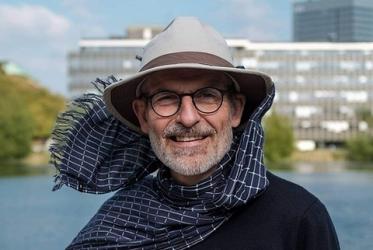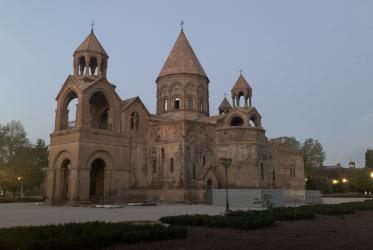5 April 2003
"Towards meaningful co-operation in mission"
Consultation of churches from Latin America and Europe
"As my Father sent me, so I send you." John 20:21
Sisters and brothers,
From 3-6 April 2003 some fifty of us, men and women from churches, missionary bodies and councils of churches in Latin America and Europe have met in the middle of Lent in the Evangelical Academy of Nordelbien, in Bad Segeberg, Germany. We were convened by the Latin American Council of Churches (CLAI), the Conference of European Churches (CEC) the World Council of Churches (WCC) and the Association of Protestant Churches and Missions in Germany (EMW).
For the first time in the history of our councils, representatives of different Protestant churches and of Orthodox Churches in 24 countries have met in order to respond to a new awareness of the importance of the mission of the Church. We have been especially motivated by the slogan of one of the churches represented among us: "No congregation without mission - No mission without congregation."
In these days we have shared our spiritual wealth, our anxieties and concerns, but also our hope, and have strengthened our spirituality through prayer, worship and in study of God's word.
Our meeting took place in a time when the world feels threatened and impotent in the face of war in Iraq: a sad manifestation of human arrogance.
We met in this consultation about mission and co-operation motivated by the changes that have occurred in the world, in our regions, and in the realities of the churches, mission agencies and church councils that we represent. We have come together in order to identify the challenges that this new situation poses to churches called to be participants in God's mission and in the hope that together we may build new forums of co-operation, sharing and mutual support.
What we reaffirm with respect to co-operation
The hope we have among us in this effort comes from the words of Jesus and the announciation of his Kingdom. (Romans 14:17). This is at the heart of our motivation and is the driving force of our pastoral and missionary practice.
- We believe that the diversity of contexts and cultures from which we come can be utilised for God's mission. It is out of that diversity that He calls us and sends us to announce the Kingdom in word and work;
- In the world which is becoming more and more globalised, in the process of which many values are being threatened if not destroyed, cultures, peoples and individuals are being fragmented, we affirm our unity in Christ and seek common ways toward co-operation in God's mission;
- Though there are tendencies to separate diakonia and mission we have encouraged one another to continue efforts to keep together both aspects as inseparable in God's mission. No diaconal initiative should be taken without contemplating the mission dimension and no missionary effort can be called such if it does not take into account diaconal work;
- As we have shared the diverse tasks which have brought us together in mission, we have discovered four common and central aspects: Spirituality, healing and reconciliation, prophetic witness and sharing. These areas of pastoral work are fundamental to be able to identify the challenges and to move together for mission in our local communities, through our churches, ecumenical bodies and co-operative agencies.
What we have discovered in the process
- That sharing our experiences and sincere dialogue among members of the churches in LA and Europe has enriched us;
- that the churches in both continents need to intensify their missionary practise and the concepts that define it in order to be able to live out it as an integral part of the day to day life of their memberships;
- that the Gospel of our Lord Jesus Christ shows clearly God's concern for the holistic good of the human being;
- that the catholicity we have experienced in our meeting revealed the wealth of the gifts available for mission. The universality of the Church enriches the witness of the church both at the local and universal level. The local church in its living faith shows forth the universality of the Church, being transformed as a result into a meaningful and unique space for God's mission.
We are concerned about the lack of a living spirituality in some of our churches. Some European churches are concerned about their numerical decrease. Others of us found ourselves faced with the great challenge of carrying out mission in a context of extreme poverty and the exclusion of large groups. We need God's Spirit to inspire us through the testimony and wisdom of persons from diverse continents.
We affirm that Healing and Reconciliation are necessary on both continents. Painful memories of a coercive and oppressive form of mission that still persists in some places need to be healed and reconciled. The brothers and sisters of Europe can be assured of the sincere appreciation - though sometimes critical of their missionary work - on the part of many Latin American Churches. The brothers and sisters from Latin America shared testimonies of the importance of healing and reconciliation in their context. Jesus' healing and reconciliation inspired us to become agents of reconciliation at a personal level, in our local congregations and in the whole of society.
We acknowledge that the public testimony of our congregations has not always been appropriate. We need the analysis and the contribution of brothers and sisters from other contexts to clarify our positions and improve our understanding of mission. Our witness may then bring us into suffering but only then will it deserve to be called prophetic.
The Sharing of our resources has not always reached the level of a true communion in Christ. The institutional structures of our churches, missionary bodies, agencies and councils of churches have often made it difficult for us to share in an egalitarian way. (II Cor. 8, 13-15)
In our difficulties to acknowledge our membership of the Body of Christ, the quality of our mutual co-operation has been damaged. In the encounter with other members of that Body, we learn to share our gifts.
What we can do as churches, congregations and bodies
- Inform one another about the life of our churches, with their joys and needs, worries and achievements;
- Pray together for faithfulness to God's mission;
- Share knowledge, reflections, and experiences in the field of mission, strengthening our awareness that we are one in the body of Christ;
- Engage in intercultural Bible studies, using existing resources in our various places and taking advantage of international ecumenical contacts;
- Collaborate with the Christian Diaspora in Europe and Latin America in serving migrants and in their contribution to mission in both continents;
- Encourage the creation of ecumenical forums for mission at all levels;
- Encourage the inclusion of holistic mission as a crucial element in the theological education of ministers;
- Encourage especially ministries to and with children and youth;
- Work on the development of new and creative forms of sharing our resources which are not only financial ones.
Bad Segeberg, 5 April 2003



